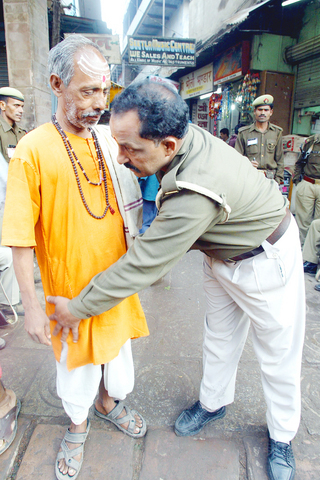The northern city of Varanasi yesterday showcased its standing as one of the country's most vibrant pilgrimage centers, two days after bomb blasts killed 15 people and triggered protests.
Markets across the Hindu holy city opened, streets bustled with traffic and tourists, Indian and foreign, returned to the ancient bathing ghats and temples by the holy Ganges river a day after Hindu groups shut the city in protests.
Police said they would continue to mount vigils to prevent a communal backlash although, they added, that appeared unlikely.

PHOTO: AP
"Violence occurs when there is anger," said Mahendra Tanna, a Varanasi businessman. "The blasts at the temple did not anger us but made us sad. Which is why there have been no riots."
"How can we associate all this with Muslims? All Muslims are not bad and all Hindus are not good," said Tanna, a Hindu.
The first bomb went off in Sankat Mochan temple where hundreds of devotees of the Hindu monkey-god Hanuman had gathered for prayers and three weddings. Another bomb then exploded at the city's main railway station. Police said both bombs were home-made devices placed in pressure cookers and connected to timers.
They said they were working on sketches of suspects based on a video shot at one of the weddings at the temple.
Analysts and intelligence officers said that although the Hindu community was targeted by suspected Islamist militants, they did not expect trouble because most Indians were weary of violence and increasingly resilient.
Besides, political groups had largely refrained from stoking tensions and Varanasi's Muslims had condemned the blasts and joined Hindus in the general strike on Wednesday, avoiding a confrontation, they said.
"We are grateful to the people that they have not allowed this situation to take a communal turn," said Yashpal Singh, police chief of Uttar Pradesh state where Varanasi is located.
"It is thanks also to the political parties as none of them tried to give this political color," he said.
Meanwhile, a hitherto unknown Islamic militant group claimed responsibility yesterday for the bombings, a Kashmiri news agency said.
"Lashkar-e-Kahar" (Army of the Imperious) said in a telephone call to Current News Service (CNS) that it carried out the bombings.
"We have carried out the attacks," said a spokesman for the group who identified himself as Abdul Jabbar, alias "Abu Kahar."
He threatened more attacks if "India does not stop atrocities against Kashmiri Muslims. Until that happens we will not allow people of India to live in peace."
Police said they had never heard of the group before but were taking the call seriously.

A feud has broken out between the top leaders of the far-right Alternative for Germany (AfD) party on whether to maintain close ties with Russia. The AfD leader Alice Weidel this week slammed planned visits to Russia by some party lawmakers, while coleader Tino Chrupalla voiced a defense of Russian President Vladimir Putin. The unusual split comes at a time when mainstream politicians have accused the anti-immigration AfD of acting as stooges for the Kremlin and even spying for Russia. The row has also erupted in a year in which the AfD is flying high, often polling above the record 20 percent it

Philippine President Ferdinand Marcos Jr yesterday vowed that those behind bogus flood control projects would be arrested before Christmas, days after deadly back-to-back typhoons left swathes of the country underwater. Scores of construction firm owners, government officials and lawmakers — including Marcos’ cousin congressman — have been accused of pocketing funds for substandard or so-called “ghost” infrastructure projects. The Philippine Department of Finance has estimated the nation’s economy lost up to 118.5 billion pesos (US$2 billion) since 2023 due to corruption in flood control projects. Criminal cases against most of the people implicated are nearly complete, Marcos told reporters. “We don’t file cases for

Ecuadorans are today to vote on whether to allow the return of foreign military bases and the drafting of a new constitution that could give the country’s president more power. Voters are to decide on the presence of foreign military bases, which have been banned on Ecuadoran soil since 2008. A “yes” vote would likely bring the return of the US military to the Manta air base on the Pacific coast — once a hub for US anti-drug operations. Other questions concern ending public funding for political parties, reducing the number of lawmakers and creating an elected body that would

‘ATTACK ON CIVILIZATION’: The culture ministry released drawings of six missing statues representing the Roman goddess of Venus, the tallest of which was 40cm Investigators believe that the theft of several ancient statues dating back to the Roman era from Syria’s national museum was likely the work of an individual, not an organized gang, officials said on Wednesday. The National Museum of Damascus was closed after the heist was discovered early on Monday. The museum had reopened in January as the country recovers from a 14-year civil war and the fall of the 54-year al-Assad dynasty last year. On Wednesday, a security vehicle was parked outside the main gate of the museum in central Damascus while security guards stood nearby. People were not allowed in because